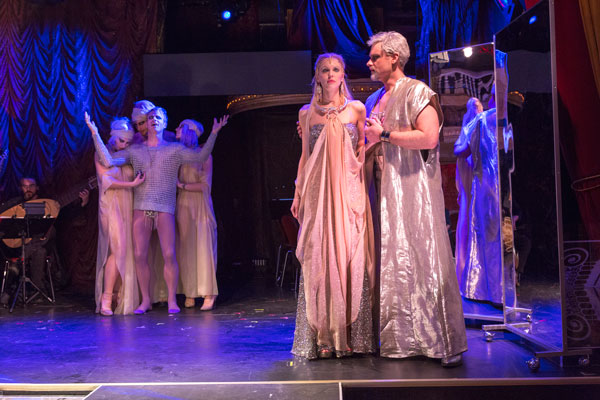
Christopher Ainslie (center) with Baroque Burlesque performers, Micaëla Oeste and Randall Scotting.
High and low get it on at one of the city’s most notorious nightclubs
BY TRAV S.D. | If you had asked me a few days ago if I were a fan of late 17th century Venetian opera I would have said, “I really don’t know…but my guess would be not.” While I’m a veteran theater reviewer, the extent of my opera savvy consists of an affection for the works of Gilbert & Sullivan and a couple of dozen productions from the traditional repertory canon which I watched (with boredom, mostly) from the nosebleed section of the Metropolitan Opera. But strange to relate, I really do believe Gotham Chamber Opera’s production of Francesco Cavalli’s 1668 “Eliogabalo” (now at the nightclub The Box) has made a convert of me.
The 12-year-old Gotham Chamber Opera specializes in reviving obscure small scale operas. “Eliogabalo,” one of Cavalli’s last works, was long thought lost. Unperformed until 1999, the current production is its U.S. premiere. It treats of the last days of the reign of the Roman Emperor Heliogabalus (203-222). Gibbon’s “History of the Decline and Fall of the Roman Empire” paints him as one of the worst in a long chain of monsters, making more familiar names like Caligula and Nero seem like Boy Scouts. Eliogabalo came to the throne at age 14 through the agency of an assassination. His own reign ended four years later through the same means. In between, there was a lot of murder, injustice, depraved favoritism, religious heresy and wild and very creative fornication.
Cavalli’s opera mostly concerns the efforts of the titular boy-king (Christopher Ainslie) to wed and bed a couple of desirable females (Susannah Biller and Micaela Oeste). Much scheming and intimidation ensues over the course of three acts, culminating in Eliogabalo’s attempt to rape the elusive object of his affections — which is thwarted when he is stabbed to death by his own guards. (Yeah! But can you DANCE to it?). Then or now, it’s absolutely over the top, and the only way to do it is with relish — which is precisely what this company brings to it. Somewhere up there in Barqoue Opera heaven, surrounded by fat, kitschy little angels, I have no doubt Cavalli is smiling. Director James Marvel does an admirable job of bridging the 345 years that have elapsed, treating the libretto and score with fidelity and bringing a bit of modern flair to the staging (but all the while, grasping the synchronicities between then and now).
Intimately ensconced on The Box’s modest stage (normally the locus of some of the city’s raciest after-hours burlesque shows), the cast of two dozen or so shares the space with a pocket orchestra made up of a string quartet, a harpsichord, and an archaic curiosity known as a theorbo (a lute that looks about six feet long).
Sung in the original Italian with supertitles, the interpretation seems respectful of its source material. I can’t imagine that musically or lyrically, it’s much different than what Cavalli intended. Yet we are in The Box. Half the action is staged on a catwalk thrust into the middle of the audience, where cast members strut and fret their half-naked bodies inches away from the ticket-holders. One character Nerbulone (Brandon Cedel, marked in the program as a baritone though it sure sounded basso to me) did a couple of old-fashioned vaudeville style nip-ups and then demanded our applause. Apropos of little but showmanship, aerialist Brian Joseph Ferree spun over our heads on a piece of fabric (this kind of circus act would not have been at all out of place in the 17th century).
The one iffy note of the evening also occurred on this platform: a seemingly improvised pre-show dance done by a small troupe in platform shoes seemed a tad clumsy, under-rehearsed and possibly dangerous. But on the whole, the historical choreography, by Company XIV’s Austin McCormick, was typically captivating.
Several of the principal parts are gender reversed, a convention in Baroque opera that speaks just as easily to our own time. Marvel’s version is livened with more than a little Ridiculous style camp, inevitable in a world where the sexual permutations are apparently limitless. As the Emperor’s scheming assistants Lenia and Zotico (John Eastman and Daryl Freedman) seem particularly inspired, each playing the other’s gender, and similarly attired in black, like a pair of androgynous bookends.
Costumes by Mattie Ullrich reinforce this vision — a confectionary hodgepodge of fashion styles evoking glam, steampunk, disco and 80s-style New Romanticism. Eliogabalo sports a multi-colored neo-classical tailcoat that wouldn’t be out of place in Prince’s wardrobe. The Praetorian Guard, sporting black shoulder pads, look like they have just trotted here from the playing fields of the XFL. Sexy fun is the coin of the realm. Riding crops and whips are wielded for our amusement. A tray full of red Jell-O molded into the shape of female breasts is brought out. When one character sings of his love’s “delicate cheeks,” Marvel stages it so that the performer sings it to her butt cheeks.
The show moves at a brisk, merry pace (atrocities notwithstanding) and the entire evening clocks at about 2 hours, 15 minutes — nearly half as long as the usual time commitment when one signs on for a night at the opera. Furthermore, we’re at The Box, which means that food and drink are available and can be consumed during the show (and aside from the famous $900 bottles of champagne, most of the prices are reasonable).
In short, populism without philistinism. That’s the kind of high culture I can embrace.
Long-time NYC Community Media arts contributor Trav S.D. is the author of the just-released “Chain of Fools: Silent Comedy and Its Legacies from Nickelodeons to Youtube” as well at the critically-acclaimed “No Applause, Just throw Money: The Book That Made Vaudeville Famous.” Follow him daily at Travalanche (travsd.wordpress.com).

























